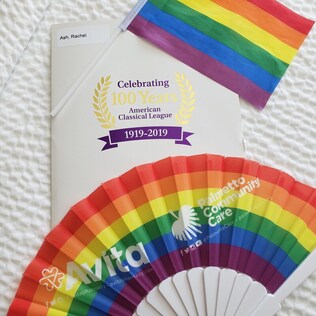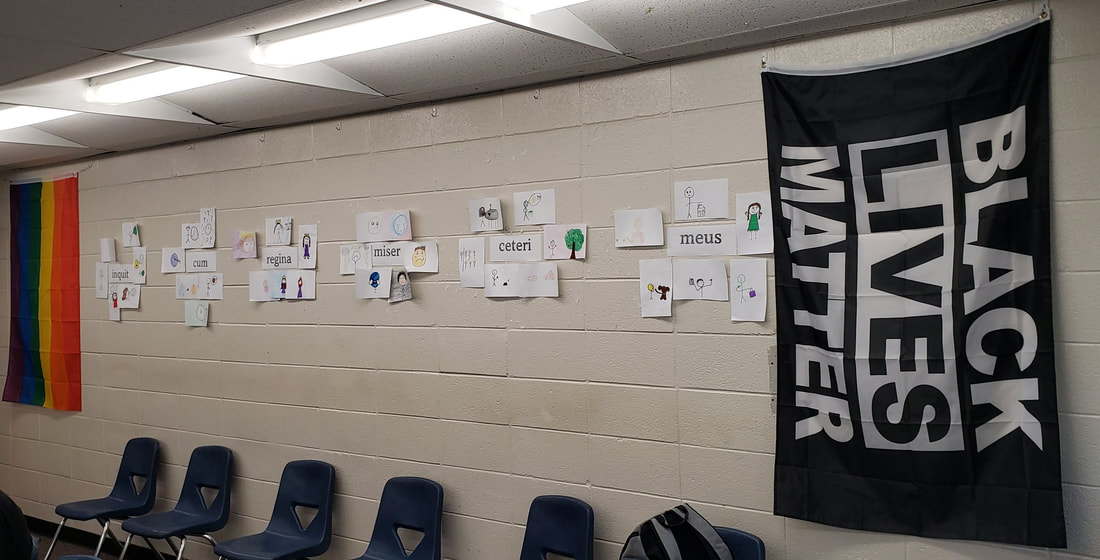|
Technically this was not a previous post, but a transcription of a speech I gave as the keynote speaker on day 3 as a co-host of the Stepping Into CI summer workshop in 2020, but I think it still counts as a Throwback Thursday post. When I first coined the term “Caring,” for CI it was a pithy way to encompass everything left over after you explain “Comprehensible” and “Compelling.” How do you describe keeping student anxiety low, making students feel valued and heard? How do you describe building relationships and trust?
Caring. After I added the third “C,” it took on a life of its own in our department [see this post by Keith Toda] and forced us, as a group, to look at ourselves and our practices and always question: “did that lesson show Caring?” Caring has become my favorite “C.” Caring is why I became a teacher. “I want to be the teacher that shows each student that someone cares.” I think that was literally part of the teaching philosophy I had to write in my one and only education course. The way I show I care has morphed over the years. It has grown. It started with seeking out students in special education and making sure they have what they need in my class. With learning that a typical class structure, which I thrive in, can be actively harmful to some students. With taking my students as they are, as they choose to be, and calling them by the names that they asked me to call them. With listening. With respect. With care. Over the years, caring has become more. It has become educating myself. Learning how the brain learns and incorporating that into my classes. Researching about the effects of socio-economic factors, racism, sexism, ableism, and homophobia in my classroom so I can learn to watch for it and do my best to fight it. Learning to battle uncomfortable topics head-on because I can’t dodge the reality of slavery in Rome by calling slaves “servants,” and doing so does my students, all of my students, a disservice. Caring has made me look at my lesson plans and see the gaps. I had worked to make personal connections with my students and make them feel seen by me (because I see them) and loved by me (because I love them), but I had never thought to examine the materials I offered them to see if they could see themselves there. They couldn’t. That’s a gap. It’s a gap I’m still mending. Caring is evaluating everything I do to make sure that it’s in the best interests of my students, not just what I’ve always done, not just what I’m comfortable with, not just part of the canon. Caring is making myself uncomfortable so I can make my students comfortable. Because when students are comfortable, when students feel seen and heard, when they see themselves in what we do, that is when they learn best. They learn they are worthwhile. They learn they are worthy. And then you can teach.
0 Comments
 I got to take time to attend the Charleston Pride Parade and then had the pleasure of constantly bumping into other members who had attended. I got to take time to attend the Charleston Pride Parade and then had the pleasure of constantly bumping into other members who had attended. We all know the past two years have been hard. I don't think I need to qualify that, or say "for some of us." Since I don't believe in the idiom "What doesn't kill you, makes you stronger," I will instead say "What doesn't kill you, changes you." And we are changed. I could list the numerous mass traumas of the past two years, but I think I will save reflecting on those to individual posts. So, here, I am going to talk about the sharing, loving, supporting, and, yes, healing that was the surprise focus of this year's American Classical League Institute. One attendee told me (I didn't take a quote, so this is absolutely paraphrase) "In past Institutes, it felt like there were camps, based on how people teach, etc., but this year it feels like we have all banded together into one group." I agree. That is not to say that every Latin teacher on that campus agreed about everything--obviously, or we're not Classics scholars--but that a common thread emerged from every session and meeting I attended. Our main focus was not on promotion of individual products and ideologies, but on sharing things that work, helping each other become better teachers, checking in to remind each other that our own health is also important. The thread was Caring and Community. Even the director of the Cambridge Classics Project (the illustrious Caroline Bristow) did not present about the CLC textbooks at all, but about a fantastic and inspiring class she taught last summer focusing on trauma, race, and misogyny in the ancient world, and ways to bring that discussion safely into our own classrooms. This was not unique--in the best way. This year I came away fully inspired, energized, and ready to work. I will probably do individual posts about the sessions I attended as I apply them to my classes--and honestly I need some time to think, reflect, and internalize some of the information before I use it. I always advise others to take one thing from a conference and implement it, and if that gets comfortable, then you can add another. I will be following my own advice! I am looking forward to next year's Institute in St. Louis already. I am immensely proud of the work we did, as a member of the ACL Board and as a Latin teacher coming together to be part of this community. Let us continue to help each other heal and become a caring community of support. |
Categories
All
Archives
November 2022
AuthorRachel Ash is a teacher, author, seamstress, mother, wife, and overdescriber. She also loves a good list. |

 RSS Feed
RSS Feed
